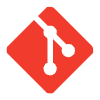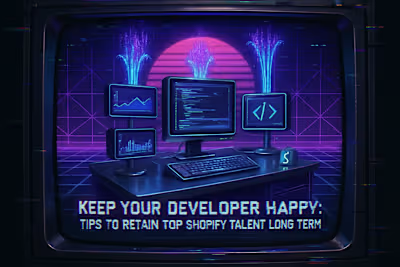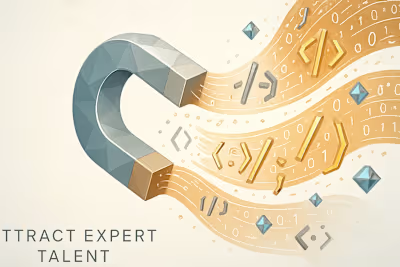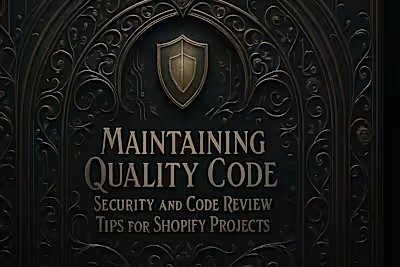20+ Essential Interview Questions for Hiring a Shopify Developer
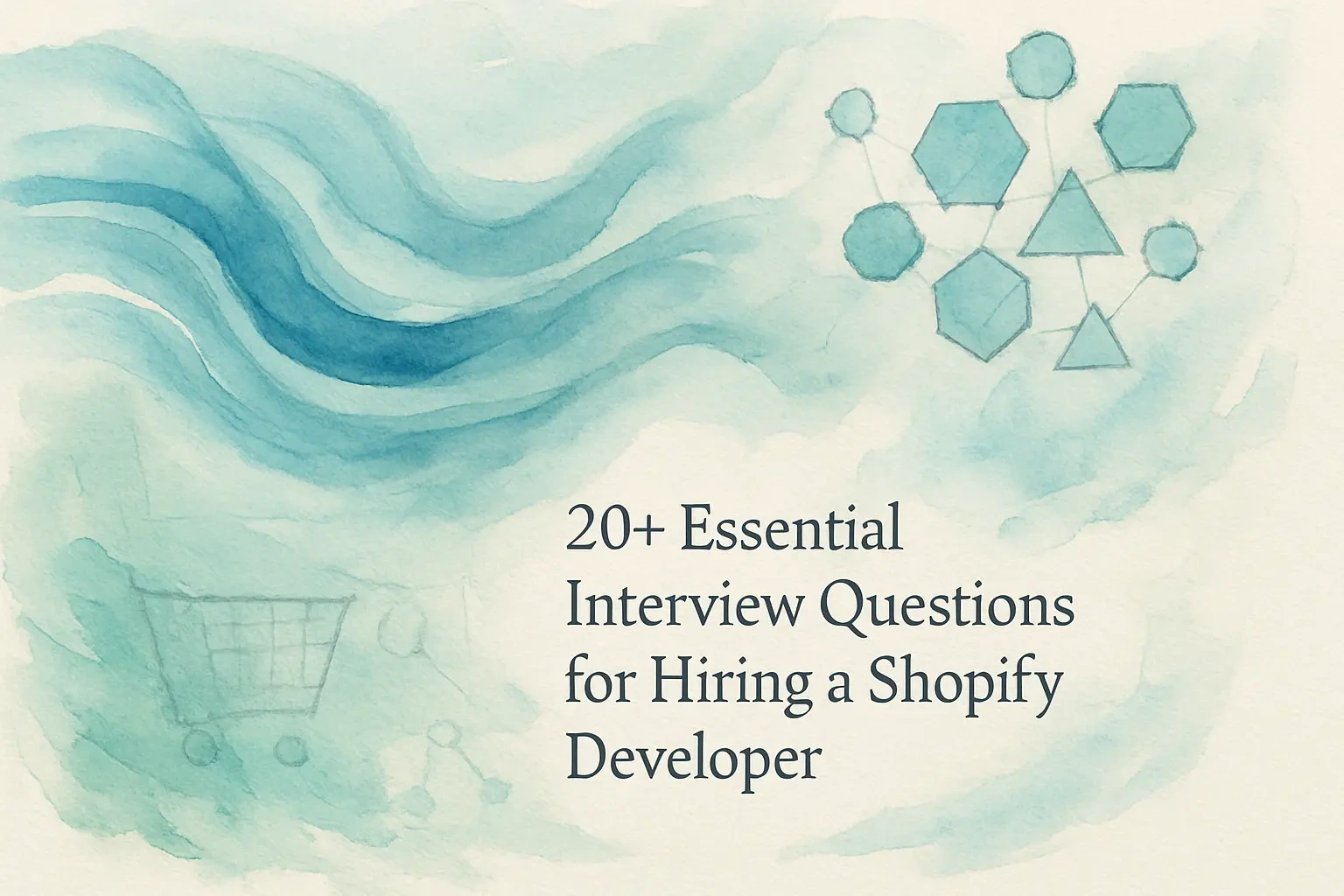
20+ Essential Interview Questions for Hiring a Shopify Developer
Technical and Platform-Specific Questions
Questions about Liquid, Themes, and Storefronts
Questions about Shopify APIs and App Development
Questions about Performance and Security
Situational and Problem-Solving Questions
Assessing Troubleshooting and Debugging Skills
Gauging Experience with Complex Projects
Evaluating Client and Project Management Skills
Behavioral and Soft Skill Questions
Communication and Collaboration
Adaptability and Continuous Learning
References
20+ Essential Interview Questions for Hiring a Shopify Developer
The interview is your opportunity to validate the skills and experience claimed on a resume. It follows the critical steps of posting a well-crafted job description and precedes the final check of evaluating their portfolio. Asking the right questions is key to uncovering a candidate's true technical depth, problem-solving ability, and cultural fit. For those who prefer to skip the complexities of the hiring process, consider hiring a Shopify developer from a curated platform like Contra.
Finding the right Shopify developer can make or break your e-commerce project. The difference between a mediocre hire and a stellar one often comes down to asking the right questions during the interview process. This guide provides you with battle-tested questions that will help you identify truly skilled Shopify developers who can deliver results.
Technical and Platform-Specific Questions
These questions assess a candidate's core knowledge of the Shopify platform and its underlying technologies. Their answers will reveal their hands-on experience and technical proficiency.
Technical competence forms the foundation of any successful Shopify project. A developer might claim years of experience, but only targeted questions can reveal their actual depth of knowledge. Pay close attention not just to what they say, but how they explain technical concepts. Strong candidates will provide clear, specific examples from their past work.
Questions about Liquid, Themes, and Storefronts
Start with fundamental questions about Shopify's core technologies. Ask: "Can you explain the structure of a Shopify theme and the role of different file types (layouts, templates, sections, snippets)?" A competent developer should easily describe how layouts provide the HTML skeleton, templates control page-specific content, sections enable customizable homepage elements, and snippets allow reusable code blocks.
Follow up with: "Describe your experience with Shopify's Liquid templating language and provide an example of a complex customization you've implemented." Listen for specific examples like creating dynamic product recommendations, building custom filtering systems, or implementing advanced cart functionality. Vague answers suggest limited hands-on experience.
Another revealing question: "How would you approach creating a custom product page template that displays different content based on product tags?" This tests their understanding of Liquid logic and theme architecture. Strong candidates will mention using conditional statements, accessing product metafields, and organizing code efficiently.
Consider asking about responsive design: "What strategies do you use to ensure Shopify themes work seamlessly across all devices?" Look for mentions of mobile-first development, CSS Grid or Flexbox usage, and testing methodologies.
Questions about Shopify APIs and App Development
API knowledge separates basic theme developers from full-stack Shopify experts. Start with: "What is the difference between the Admin API and the Storefront API, and when would you use each?"
A solid answer should explain that the Admin API handles backend operations like inventory management and order processing, while the Storefront API enables custom shopping experiences on the frontend. They should provide examples like using the Admin API for bulk product updates or the Storefront API for headless commerce implementations.
Dive deeper with: "Can you walk me through the key steps of creating a custom Shopify app?" Listen for mentions of authentication flows, webhook implementation, app proxies, and the app review process. Experienced developers will discuss challenges they've faced and solutions they've implemented.
Test their practical knowledge: "How would you handle rate limiting when making API calls to Shopify?" Good answers include implementing retry logic, using bulk operations, and respecting API call limits. This question reveals whether they've dealt with real-world API constraints.
Ask about specific scenarios: "Describe a situation where you needed to sync data between Shopify and an external system. What approach did you take?" Their response should demonstrate understanding of webhooks, polling strategies, and data consistency challenges.
Questions about Performance and Security
Performance directly impacts conversion rates, making this area crucial. Ask: "How do you approach optimizing a Shopify store for performance and fast load times?"
Strong candidates will discuss lazy loading images, minimizing JavaScript execution, leveraging browser caching, and optimizing critical rendering paths. They might mention tools like Google PageSpeed Insights or GTmetrix for measurement. Look for specific metrics they target, like achieving sub-3-second load times.
Probe their optimization strategies: "What techniques do you use to reduce the impact of third-party scripts on site performance?" Experienced developers will talk about script deferral, conditional loading, and performance budgets.
Security knowledge is equally important. Ask: "What are the key security considerations you keep in mind when developing for Shopify?"
Listen for mentions of input validation, secure API key storage, HTTPS enforcement, and protection against common vulnerabilities like XSS and SQL injection. They should understand Shopify's built-in security features and know when additional measures are needed.
Test their security mindset: "How would you securely handle customer data in a custom Shopify app?" Good answers include encryption practices, secure data transmission, compliance considerations, and following Shopify's data protection guidelines.
Situational and Problem-Solving Questions
These questions evaluate a candidate's thought process and how they handle real-world challenges. Look for structured, logical answers that demonstrate experience.
Real-world development rarely goes according to plan. These questions reveal how candidates think on their feet and handle the unexpected challenges that inevitably arise in e-commerce projects. Pay attention to their problem-solving methodology and communication style.
Assessing Troubleshooting and Debugging Skills
Present realistic scenarios to test their diagnostic abilities. Start with: "A client reports that the checkout button is not working intermittently. How would you troubleshoot this issue?"
A systematic approach should emerge. Strong candidates will mention checking browser console errors, testing across different devices and browsers, examining recent code changes, reviewing third-party script conflicts, and using Shopify's preview tools. They should also discuss communication with the client to gather more details about when the issue occurs.
Follow up with: "You've inherited a Shopify store with poor performance and messy code. What's your approach to improving it?" Look for a methodical plan including performance audits, code review, prioritization of fixes, and incremental improvements. They should mention creating a testing environment and documenting changes.
Test their analytical skills: "A store's conversion rate suddenly drops by 30%. Walk me through your investigation process." Good developers will consider multiple factors: recent theme changes, new apps installed, checkout process modifications, payment gateway issues, and even external factors like market changes.
Gauging Experience with Complex Projects
Complex projects reveal a developer's true capabilities. Ask: "Describe the most challenging Shopify project you've worked on. What was the problem, what was your approach, and what was the outcome?"
Listen for specific technical challenges, not just general difficulties. Strong candidates will describe complex integrations, performance optimizations, or custom functionality that pushed Shopify's limits. They should explain their decision-making process and what they learned from the experience.
Probe deeper: "Tell me about a time when you had to implement a feature that Shopify doesn't natively support. How did you approach it?" This reveals their creativity and technical depth. Examples might include custom subscription models, complex pricing rules, or advanced inventory management.
Ask about scale: "Have you worked on high-traffic Shopify stores? What special considerations did you have to make?" Experience with Black Friday traffic, flash sales, or stores processing thousands of daily orders requires different approaches than typical development.
Evaluating Client and Project Management Skills
Technical skills mean little without the ability to manage projects effectively. Ask: "How would you handle a client request for a significant change in project scope midway through development?"
Look for a balanced approach that considers technical feasibility, timeline impact, and budget implications. Strong candidates will mention documenting the change, providing options with trade-offs, and maintaining clear communication throughout the process.
Test their migration experience: "Describe your experience migrating a store from another platform (e.g., Magento, WooCommerce) to Shopify."
Comprehensive answers should cover data migration strategies, SEO preservation, URL redirects, customer communication, and testing procedures. They should mention tools they've used and challenges they've overcome, like handling platform-specific features that don't have direct Shopify equivalents.
Ask about stakeholder management: "How do you handle situations where different stakeholders have conflicting requirements for a Shopify project?" This reveals their diplomatic skills and ability to find solutions that satisfy multiple parties.
Behavioral and Soft Skill Questions
Technical skills are only part of the equation. These questions help determine if the candidate will be a good fit for your team and work environment.
The best Shopify developer in the world won't succeed if they can't communicate effectively or adapt to your team's culture. These questions uncover the human side of the candidate and predict how well they'll integrate into your organization.
Communication and Collaboration
Effective communication bridges the gap between technical and non-technical team members. Ask: "How do you ensure non-technical stakeholders understand the progress and challenges of a development project?"
Strong answers include using visual aids, avoiding jargon, providing regular updates with concrete examples, and translating technical constraints into business impact. They might mention creating simple documentation or using project management tools that everyone can understand.
Explore their collaboration style: "Describe a time when you had to work closely with designers, marketers, or other non-developers on a Shopify project. How did you ensure smooth collaboration?" Look for examples of proactive communication, setting clear expectations, and finding common ground between different perspectives.
Test their client communication: "A client is frustrated because a feature they want seems simple but is actually complex to implement. How do you handle this conversation?" Good developers educate without condescending, provide alternatives, and help clients understand the value of doing things correctly.
Adaptability and Continuous Learning
The e-commerce landscape evolves rapidly, making adaptability crucial. Ask: "How do you stay up-to-date with the latest changes to Shopify's platform and emerging e-commerce trends?"
Look for specific resources they use: Shopify's developer changelog, community forums, conferences, online courses, or experimental projects. Passionate developers will have multiple learning channels and might mention recent features they're excited about.
Test their growth mindset: "Tell me about a time when you had to quickly learn a new technology or tool for a Shopify project." Their answer reveals how they handle being outside their comfort zone and their approach to acquiring new skills under pressure.
Ask about failure and learning: "Describe a mistake you made on a Shopify project and what you learned from it." Honest answers that show growth and improved processes indicate maturity and self-awareness.
Probe their future vision: "Where do you see e-commerce development heading in the next few years, and how are you preparing for these changes?" This reveals whether they're thinking strategically about their career and the industry's direction.
Remember, the best interviews feel like conversations between professionals. While these questions provide a framework, allow room for natural follow-ups based on the candidate's responses. The goal isn't just to test knowledge but to understand how they think, solve problems, and whether they'll thrive in your specific environment.
By asking these comprehensive questions, you'll gain deep insights into each candidate's technical abilities, problem-solving skills, and cultural fit. The right Shopify developer will demonstrate not just technical competence but also the communication skills, adaptability, and passion that drive successful e-commerce projects.
References
Like this project
Posted Jul 4, 2025
Go beyond basic questions. Here are the technical, behavioral, and situational questions you must ask to identify a truly skilled Shopify developer.




